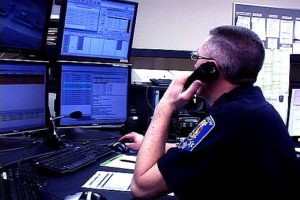What is Alarm Monitoring and how does it work?
Alarm monitoring does not mean that someone is looking inside your house at everything you do all the time. Rather, alarm monitoring is a state-of-the-art technology combining devices and human resources to protect your home or business. When a security breach or emergency event occurs at a monitored location, your control panel sends a detailed incident report to our central office. The central office notifies appropriate authorities, sending them to your property. Professional monitored security systems are the only way to protect your assets around the clock.

Alarm Monitoring Details
For example, when your armed security system is trespassed, a siren sounds at your premises and the control panel sends information about the event. Information is sent by telephone, DSL or Cable to the central office. The information signal contains details about the event, which an operator quickly examines and uses to determine an appropriate response. Details include account information and sensor type, which are used in determining the type of event. Events may include break in, fire or water emergencies.
Alarm Monitoring Operators
 The alarm monitoring operator takes appropriate action which includes calling the home or business owner, notifying security personnel, and contacting the Police or Fire Departments. In the first step, operators contact the property owner at the property phone or mobile phone. If there is an answer at the property contact number the operator first confirms a password. Next the operator verifies whether the event is an actual event or a false alarm. If no one is reached at the property contact number(s), then the operator moves to the second step. In the second step, the operator dispatches the right authority. Lastly, in the third step, the operator notifies persons, who are on your predetermined call list, about the event.
The alarm monitoring operator takes appropriate action which includes calling the home or business owner, notifying security personnel, and contacting the Police or Fire Departments. In the first step, operators contact the property owner at the property phone or mobile phone. If there is an answer at the property contact number the operator first confirms a password. Next the operator verifies whether the event is an actual event or a false alarm. If no one is reached at the property contact number(s), then the operator moves to the second step. In the second step, the operator dispatches the right authority. Lastly, in the third step, the operator notifies persons, who are on your predetermined call list, about the event.
Alarm Monitoring Events and Devices
Events occur when system devices are triggered by external means. Systems are tailored to individual and business needs and may include a variety of sensors, detectors and surveillance equipment. Sensor types include window sensors, door sensors and tamper sensors. Detectors include, motion detectors, temperature detectors, flood detectors, and fire and smoke detectors. Minuteman also offers other equipment tailored to your needs. Such as video surveillance monitoring cameras, environmental business system monitoring cameras, and multiple data connections.
Non-Monitored Alarms
 Non-monitored alarms are also known as local alarms. Local alarms do not notify central stations but they do provide limited benefits especially when authorized persons are present. Alarm noise alerts people on the premises that there’s a problem and may be enough to frighten away some intruders. More-determined burglars just ignore alarm noise and disarm your control panel quickly. Few people respond to alarms unless they become a persistent nuisance. So if an intruder disables an alarm quickly and no one is there then the intruder usually gets away with the crime.
Non-monitored alarms are also known as local alarms. Local alarms do not notify central stations but they do provide limited benefits especially when authorized persons are present. Alarm noise alerts people on the premises that there’s a problem and may be enough to frighten away some intruders. More-determined burglars just ignore alarm noise and disarm your control panel quickly. Few people respond to alarms unless they become a persistent nuisance. So if an intruder disables an alarm quickly and no one is there then the intruder usually gets away with the crime.
Benefits of Monitored Alarm Systems
Persons who have monitored alarm systems derive many benefits. Chief among those benefits is peace of mind. The common disaster plan is evacuation and recovery. But the best plan is prevention. Monitored alarms can actually prevent or reduce damage caused by fire and water as well as catch intruders in the act of committing crimes. Another benefit is a homeowner’s insurance discount. In the event that you do loose property, having notified the authorities properly will assist in recovering losses through your insurance. Additionally, some insurance companies will discount as much as 20% of your homeowner’s premium if you have monitored alarm service from Minuteman Security Systems.
For more information on 24/7 alarm monitoring by Minuteman Security Systems or to request a free quote call 888 252-7641.
